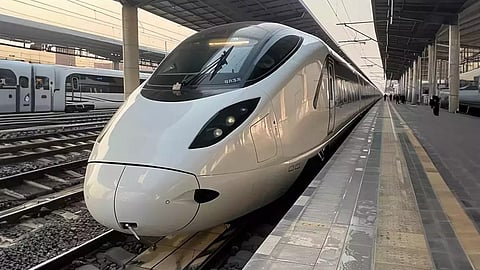Lahore to Karachi in just 5 hours: All you need to know about Pakistan's first bullet train
Backed by CPEC, the $6.8 billion high-speed rail project promises to transform travel

Dubai: Pakistan Railways has revealed plans for the country’s first bullet train, aiming to slash travel time between Lahore and Karachi from nearly 20 hours to just 5 by 2030.
The project, part of the $6.8 billion Main Line-1 (ML-1) upgrade under the China-Pakistan Economic Corridor (CPEC), is being hailed as the boldest transport initiative in Pakistan’s history.
Pakistan Railways Minister Hanif Abbasi, who announced the plan earlier this year, said the high-speed rail would not only modernise Pakistan’s ageing railway network but also provide a cheaper and faster alternative to air travel. The project will be executed with the support of Chinese firms, including the China Railway Construction Corporation.
A game-changer for travel and trade
The bullet train will operate along a 1,215-kilometre route between Karachi and Lahore, with major stops in Hyderabad, Multan, and Sahiwal. Designed for speeds of up to 250km/h, the train will cut the journey down to five hours, compared to the current 18—22 hours on express services like the Green Line.
Ticket prices are expected to range between PKR 5,000 and 10,000 for economy and business class, far below average airfare (PKR 20,000—30,000), making it accessible to students, professionals, and families, according to Pakistani media.
Double tracks
The ML-1 upgrade includes laying double tracks, rebuilding old bridges, and installing advanced signalling systems to replace Pakistan’s century-old rail infrastructure, currently limited to 60—105km/h.
Earlier this year, Punjab Chief Minister Maryam Nawaz Sharif has already greenlit the Lahore—Rawalpindi Bullet Train Project. The proposed rail link is expected to reduce travel time between the two major cities to just two and a half hours, a dramatic improvement from the current four to five hours journey.
Lahore-Karachi bullet train project timeline
Feasibility study: Completed in June 2025
Construction: To begin in 2026, with completion targeted for 2030
Testing phase: Scheduled for 2029
Launch: Expected in 2030, with 10—15 daily trips planned
Job creation
Beyond faster travel, the project is projected to create thousands of jobs during construction and operation, boost regional trade, and increase Pakistan’s freight rail share from 4% to 20% by 2030. It is also expected to reduce reliance on costly road transport, saving billions in fuel imports.
A bold step
If completed on schedule, the Lahore—Karachi bullet train will redefine how Pakistanis travel, offering an affordable, high-speed option rivalling air travel. Officials say the initiative could also strengthen Pakistan’s role in regional trade by linking eventually to a future Kashgar—Karachi rail line under CPEC.
“This project is not just about reducing travel time. It’s about reshaping Pakistan’s economy, creating opportunities, and connecting people like never before,” said Abbasi.
Route and features
Distance: 1,215km from Karachi Cantonment to Lahore Junction
Major stops: Hyderabad, Multan, and Sahiwal
Speed: Maximum 250km/h, average 243km/h
Travel time: Reduced from 18—22 hours to just 5 hours
Economic boost: Connects Pakistan’s economic hubs (Karachi and Lahore), increasing trade and raising rail freight share from 4% to 20% by 2030.
Job creation: Thousands of jobs in Sindh and Punjab during construction and operations,
Sign up for the Daily Briefing
Get the latest news and updates straight to your inbox




